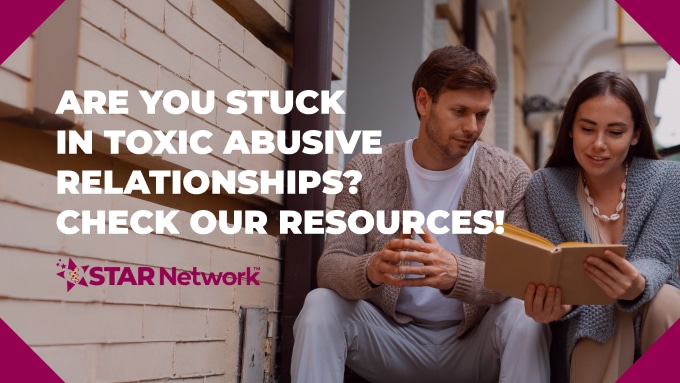Trauma-Informed Blog
New content weekly! Survivor Stories, Research Articles, Poetry, and more written by clinicians, coaches, survivors, and mental health professionals.

Featured Partner: STAR Network
Discover more about overcoming Toxic Abusive Relationships (TAR), trauma, and building resilience with our featured partner and ally, STAR Network. Their resources empower you to embrace your strength and transformation – you are not a victim; you are now a STAR, a Survivor of Toxic Abusive Relationships. Click the banner or visit STAR Network to explore their resources and start your journey to healing and empowerment today.
Remember...
CPTSD Foundation is not crisis care. If you ever feel you are in crisis please reach out to an online or local crisis resource, or contact your mental health or medical provider. CPTSD Foundation provides a tertiary means of support; adjunctive care. Our industry-leading ancillary products and services are intended to supplement individual therapy. Nothing on this website or any associated CPTSD Foundation websites, is a replacement for or supersedes the direction of your medical or mental health provider, nor is anything on this or any associated CPTSD Foundation website a diagnosis, treatment plan, advice, or care for any medical or mental health illness, condition, or disease.
Passive Suicide
***TRIGGER WARNING*** This article will tackle active suicide and may not be suitable for sensitive audiences. Most of us recognize suicide as being something someone does to...
The Link Between Trauma Exposure and Cigarette Smoking
People who have experienced trauma may use different coping methods to address their vulnerability and feelings of stress and anxiety. One of the typical coping methods among those who have...
CPTSD in the Workplace: Personal Empowerment
How to step into your personal power I have heard people talking about stepping into their power, but I never understood what they were talking about until recently when I got a little curious...
Making Sense of the Body – Your Presence is Required
Developing An Accurate ‘Felt Sense’ Our whole body encompasses our physical, mental, emotional, energetic, and spiritual experiences. A felt sense resides deep within the intelligence of our...
The Anxiety Relief Tool You Need to Try
Introduction: We all deal with anxiety – that mix of nerves, restlessness, and worries that can make life feel overwhelming. No surprise, anxiety is the most common mental health diagnosis in the...
How Creativity Can Help Trauma
Hi, I am Vicky a new guest writer with CPTSD Foundation.I understand first-hand how complex trauma can take your life from under your feet, causing adomino effect on your work, family life, and...
Suicide and Complex Trauma
***TRIGGER WARNING*** This article will tackle active suicide and may not be suitable for sensitive audiences. September is Suicide Prevention Month. This article, which is part of a series,...
CPTSD: A Day in the Life
Many people in the UK and other countries have little understanding of Post Traumatic Stress Disorder (PTSD) outside of veterans. Even more, people have absolutely no knowledge of Complex Post...
My Boss Triggers Me
What to do when your boss reminds you of your abuser. As a trauma recovery career coach, one of the common challenges I hear from survivors is that they are triggered by their boss, or their boss...
How to Stop Living by Default and Build Emotional Self-Awareness
Why is no one talking about our lack of emotional training? Even as trauma moves into the forefront, there is still a long way to go when it comes to informing others, especially those who don’t...
Feel So Different: Two Years After Diagnosis
When Sinéad O’Connor’s The Lion and the Cobra was released in 1987, I was an exchange student spending my senior year of high school in West Berlin, Germany. My mom and stepdad sent me the...
The Trauma Response and Suicide
****Trigger Warning**** This article talks about suicide and suicidal ideation, which may not be suitable for all people. Reader caution is advised. The trauma response causes people not to think...

What is Complex Post-Traumatic Stress Disorder?
“Complex PTSD comes in response to chronic traumatization over the course of months or, more often, years. This can include emotional, physical, and/or sexual abuses, domestic violence, living in a war zone, being held captive, human trafficking, and other organized rings of abuse, and more. While there are exceptional circumstances where adults develop C-PTSD, it is most often seen in those whose trauma occurred in childhood”.




